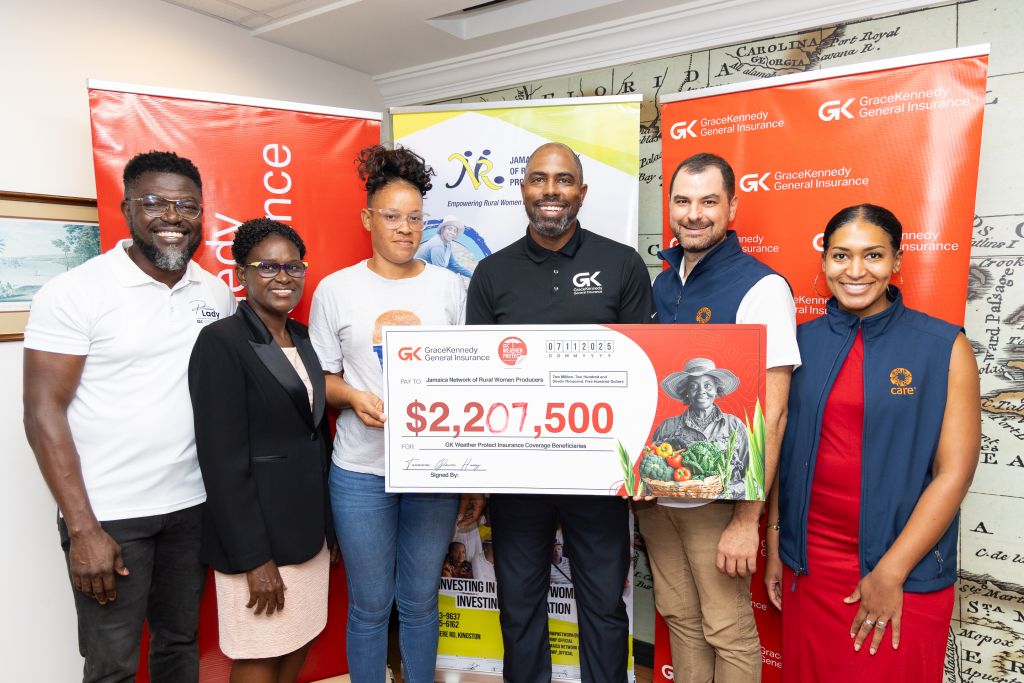GK Weather Protect, the parametric insurance policy offered by GK General Insurance (GKGI), a member of the GraceKennedy Group, has been triggered following the passage of Hurricane Melissa just over a week ago, with the company now making payouts to farmers severely affected by the storm.
(L-R) Orette Duncan, Client & Partner Services Manager, GK General Insurance (GKGI) and Marva Allen-Simms, Board Director, Jamaica Network of Rural Women Producers (JNRWP) flanks poultry farmer, Shariann Brown, third left, who received a symbolic cheque of J$2.2 million for the first accelerated payout from GK Weather Protect’s parametric insurance coverage, payable to 30 female farmers following the recent passage of Hurricane Melissa at GKGI’s office on Friday, November 7. Also featured in the photo are Steven Whittingham, centre, Chief Executive Officer (CEO) of the GraceKennedy Financial Group, and C.A.R.E International’s Jonathan Arageti, Caribbean Humanitarian Response Lead, and Camille Davis, Senior Humanitarian Director.

At a handover ceremony held last Friday at GKGI’s New Kingston office, 30 female farmers from the Jamaica Network of Rural Women Producers (JNRWP) received the first round of payments. Additional disbursements are scheduled over the coming days to other affected farmers and fisherfolk across the island.
Orette Duncan, client and partner services manager at GKGI, at the ceremony underscored the policy’s effectiveness in providing timely and meaningful relief in times of distress.
“During this, the second season of the programme for 2025, a total of 186 farmers were insured for one of three weather-related perils. Given the hurricane wind triggers met, payouts will be made to 134 of those farmers. In total, we will disburse approximately $5.44 million islandwide, aligned to the level of damage each community experienced,” he said.
Launched in 2021, GK Weather Protect was designed to safeguard the livelihoods of Jamaica’s farmers and fishers against the growing threat of extreme weather. The policy offers flexible protection, allowing clients to choose coverage for specific perils — including excessive rainfall, drought, and hurricane-force winds or even to combine them for comprehensive protection. Coverage starts at $50,000, with incremental increases available, and no monthly payments required.
Duncan, noting the current payout distribution, said that in total 61 farmers will receive the maximum benefit of either $50,000 or $150,000, amounting to $4.25 million. An additional 28 farmers will receive 25 per cent payments totaling $800,000, while 14 farmers will receive 15 per cent payments totaling $120,000, 19 farmers will receive 10 per cent payments totalling $200,000 and nine farmers, 5 per cent payouts totalling $70,000.
“We are especially proud to share today that all 30 members of the JNRWP will receive support valued at $2,207,500 — including 12 farmers who will each receive the maximum payout of $150,000, reflecting the severe losses they faced,” he added, while noting that across the island six parishes (Manchester, St Elizabeth, Westmoreland, Hanover, St James and Trelawny), experienced Category 5 winds.
“St Mary, St Ann, and Clarendon faced Category 4 conditions as St Catherine experienced Category 3 winds, St Andrew Category 2 and the parishes of Kingston, St Thomas, and Portland endured Category 1 impacts. These triggers form the basis for each farmer’s payout,” he further explained. The policy’s latest activation follows previous payouts made after Hurricane Beryl last year and earlier compensation related to severe flooding. The current trigger comes amid widespread devastation caused by Hurricane Melissa, a powerful Category Five system that struck Jamaica on October 28.
Preliminary estimates from the Ministry of Agriculture place total agricultural losses at approximately $20 billion, with the hardest-hit parishes including St Elizabeth, Westmoreland, and some other key food-producing areas in western Jamaica.
Agriculture Minister Floyd Green, describing the storm’s impact as “crippling”, noted its destruction of key crops, including an estimated 90 per cent loss of banana and plantain along with severe damage to vegetables, yams and fruit trees. The livestock sector was similarly affected, with around 40 per cent of the country’s layer flock lost while the fisheries industry sustained heavy blows with about 25 per cent of fishing fleet destroyed and 41 per cent of aquaculture facilities damaged.
As awareness and interest in parametric insurance continues to grow, GKGI reaffirmed its commitment to expanding the reach of the Weather Protect policy across Jamaica with plans to aggressively tap into the national database comprising 200,000-plus registered farmers.
The country itself stands to benefit from similar protection mechanisms. The World Bank announced last Friday that, following the devastation caused by Hurricane Melissa, the Government of Jamaica will receive the full US$150 million or approximately $24 billion payout from its parametric catastrophe bond.
Steven Whittingham, CEO of the GraceKennedy Financial Group (GKFG), speaking at the handover ceremony underscored the critical role of parametric insurance in enabling faster recovery.
“Because this is parametric insurance, the moment wind speeds crossed the threshold, relief began not months later, not after paperwork and inspections, but immediately. That speed is not a convenience; it is a lifeline. That’s what we’re seeking to provide at GKFG,” he said. “We are committed to delivering superior value, service excellence, and becoming the region’s most trusted financial partner.”
“We are not just handing over funds. We are standing in solidarity with you, our farmers, as you rebuild. We are also reaffirming our commitment to strengthening Jamaica’s food security, protecting livelihoods, and fortifying our agricultural sector against future climate events,” Duncan also said.
